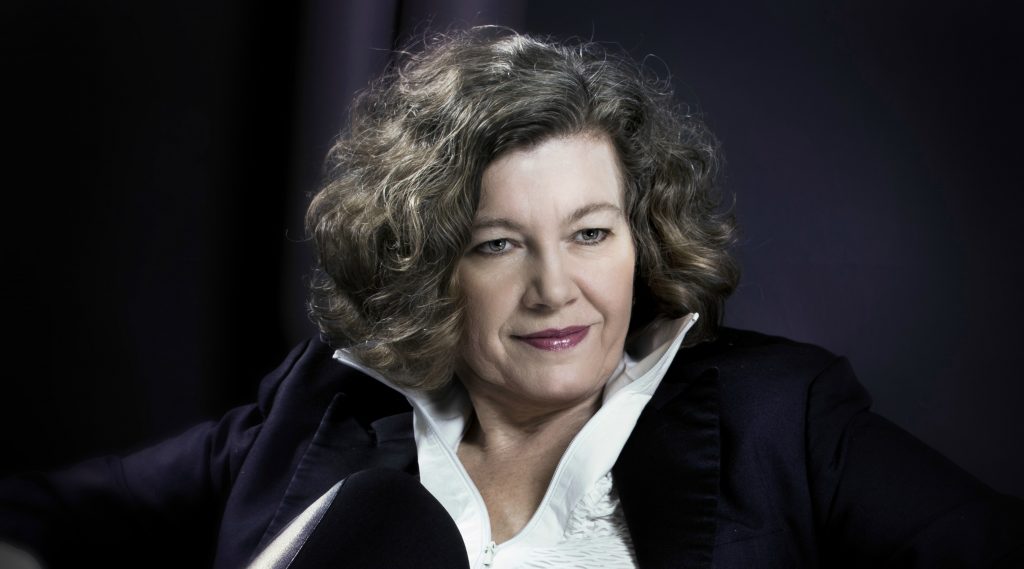LIVELab to be transformed into German cabaret

German cabaret singing had a short, if influential, life, reaching its fullest expression between the two World Wars – a period known as the Weimar era. Flaming into existence following the end of the Wilhelmine monarchy at the conclusion of World War I, it was quickly and brutally extinguished when Adolf Hitler was appointed Chancellor in 1933, with what little remained driven far underground.
Now, singer-songwriter Adi Braun is kindling the fire of cabaret once again – this time at McMaster’s LIVELab on April 13 and 14.
Braun, along with a five-piece band, will present songs from her latest album, Moderne Frau, a tribute to the empowered, embattled, provocative German women of the cabaret era whom Braun calls “the original Pantsuit Nation” – a nod to modern-day supporters of 2016 U.S. presidential candidate Hillary Clinton.
“These songs – which draw their inspiration from European operetta, but also from American jazz and blues – explore the freedoms and advances, but also the hardships that women experienced during that brief epoch,” she explains. “I find these women incredibly unique and very courageous – they were definitely trailblazers.”
The era of cabaret in Germany coincided with several political, legal and cultural shifts that redefined – at least for a little while – what the role of a woman could be, says McMaster history professor Pamela Swett, who will be providing some extra historical context to Braun’s concert with a short talk about women of the Weimar era.
“In the 1920s, we start to hear about the ‘new woman’ – the iconic, young, economically independent woman who was likely working in a publicly visible white-collar job as a receptionist or store clerk and characterized visually by her short haircut and (relatively) short skirt,” explains Swett, who specializes in the history of Germany during the Weimar period and the Third Reich. “The First World War had a significant impact on gender norms – during the war, women had been ‘manning’ the home front, and that enlightened them and others that women could be more independent.”
But with progress comes backlash – and Swett points out that the art of the Weimar Republic, including cabaret, owes a great deal to the rancour between those who felt optimistic about Germany’s future and those whose despair over the devastation of World War I did not fade.
That tension between growing liberation and entrenched social conventions is evident in many of the songs Braun will be singing, which include her own compositions. One, called Gestern, is “a bittersweet tango” about doomed love between two women – one Jewish and one not. Another, Josephine, is about singer Josephine Baker, who found fame as a performer in interwar Europe after racism curtailed her career in the United States.
“What is interesting to me about cabaret is how it broke away from really conventional classical music and developed a new form – much like these women were doing in their own lives,” Braun says. “I was really inspired by their brazenness, but also the difficulties they experienced.”
Along with her own pieces, Braun will also be exploring the contemporary composers of the Weimar era, including Kurt Weill, the composer of The Threepenny Opera and its most recognizable song, “Mack the Knife.” Arguably the most well-known composer of that period to North American audiences, Weill fled first to Paris, then to the United States after becoming the target of Nazi denunciation.
Braun has worked with the LIVELab to make the concert an immersive experience for the audience, creating a slideshow that will accompany her performance, and developing a soundscape that mimics the atmosphere of an authentic Berlin cabaret of the 1920s. Rather than traditional theatre seating, small tables and chairs will be set up – cabaret-style – and concert-goers will be able to enjoy German hors d’oeuvres and selections from a cash bar.
“We hope to tell a story,” says Braun. “We’re going to transport people into what an authentic cabaret would look and feel like, and then tell the story of these women – the women of Weimar.”
For more information and to get tickets, go to http://livelab.mcmaster.ca/series10db/.


